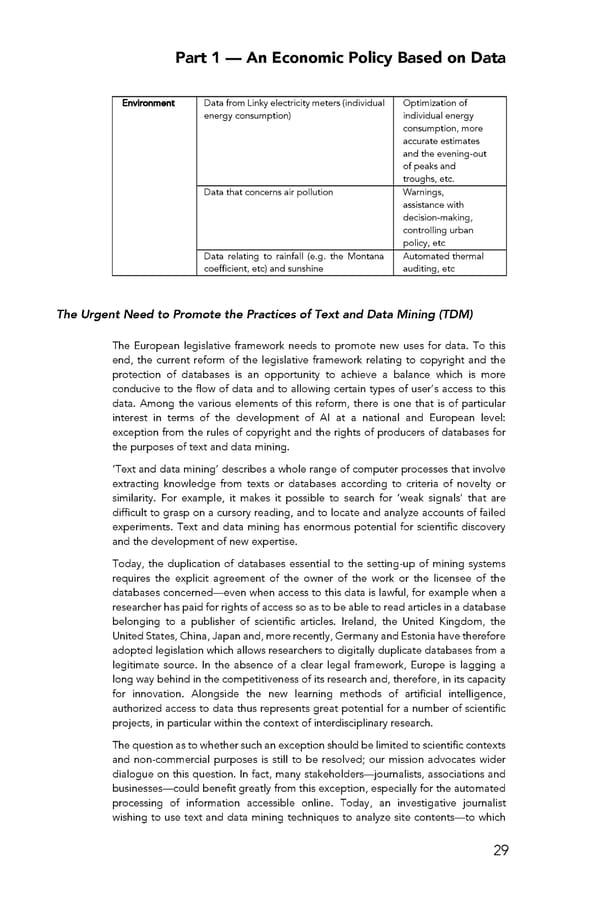Part 1 — An Economic Policy Based on Data Environment Data from Linky electricity meters (individual Optimization of energy consumption) individual energy consumption, more accurate estimates and the evening-out of peaks and troughs, etc. Data that concerns air pollution Warnings, assistance with decision-making, controlling urban policy, etc Data relating to rainfall (e.g. the Montana Automated thermal coefficient, etc) and sunshine auditing, etc The Urgent Need to Promote the Practices of Text and Data Mining (TDM) The European legislative framework needs to promote new uses for data. To this end, the current reform of the legislative framework relating to copyright and the protection of databases is an opportunity to achieve a balance which is more conducive to the flow of data and to allowing certain types of user’s access to this data. Among the various elements of this reform, there is one that is of particular interest in terms of the development of AI at a national and European level: exception from the rules of copyright and the rights of producers of databases for the purposes of text and data mining. ‘Text and data mining’ describes a whole range of computer processes that involve extracting knowledge from texts or databases according to criteria of novelty or similarity. For example, it makes it possible to search for ‘weak signals’ that are difficult to grasp on a cursory reading, and to locate and analyze accounts of failed experiments. Text and data mining has enormous potential for scientific discovery and the development of new expertise. Today, the duplication of databases essential to the setting-up of mining systems requires the explicit agreement of the owner of the work or the licensee of the databases concerned—even when access to this data is lawful, for example when a researcher has paid for rights of access so as to be able to read articles in a database belonging to a publisher of scientific articles. Ireland, the United Kingdom, the United States, China, Japan and, more recently, Germany and Estonia have therefore adopted legislation which allows researchers to digitally duplicate databases from a legitimate source. In the absence of a clear legal framework, Europe is lagging a long way behind in the competitiveness of its research and, therefore, in its capacity for innovation. Alongside the new learning methods of artificial intelligence, authorized access to data thus represents great potential for a number of scientific projects, in particular within the context of interdisciplinary research. The question as to whether such an exception should be limited to scientific contexts and non-commercial purposes is still to be resolved; our mission advocates wider dialogue on this question. In fact, many stakeholders—journalists, associations and businesses—could benefit greatly from this exception, especially for the automated processing of information accessible online. Today, an investigative journalist wishing to use text and data mining techniques to analyze site contents—to which 29
 For a Meaningful AI - Report Page 29 Page 31
For a Meaningful AI - Report Page 29 Page 31